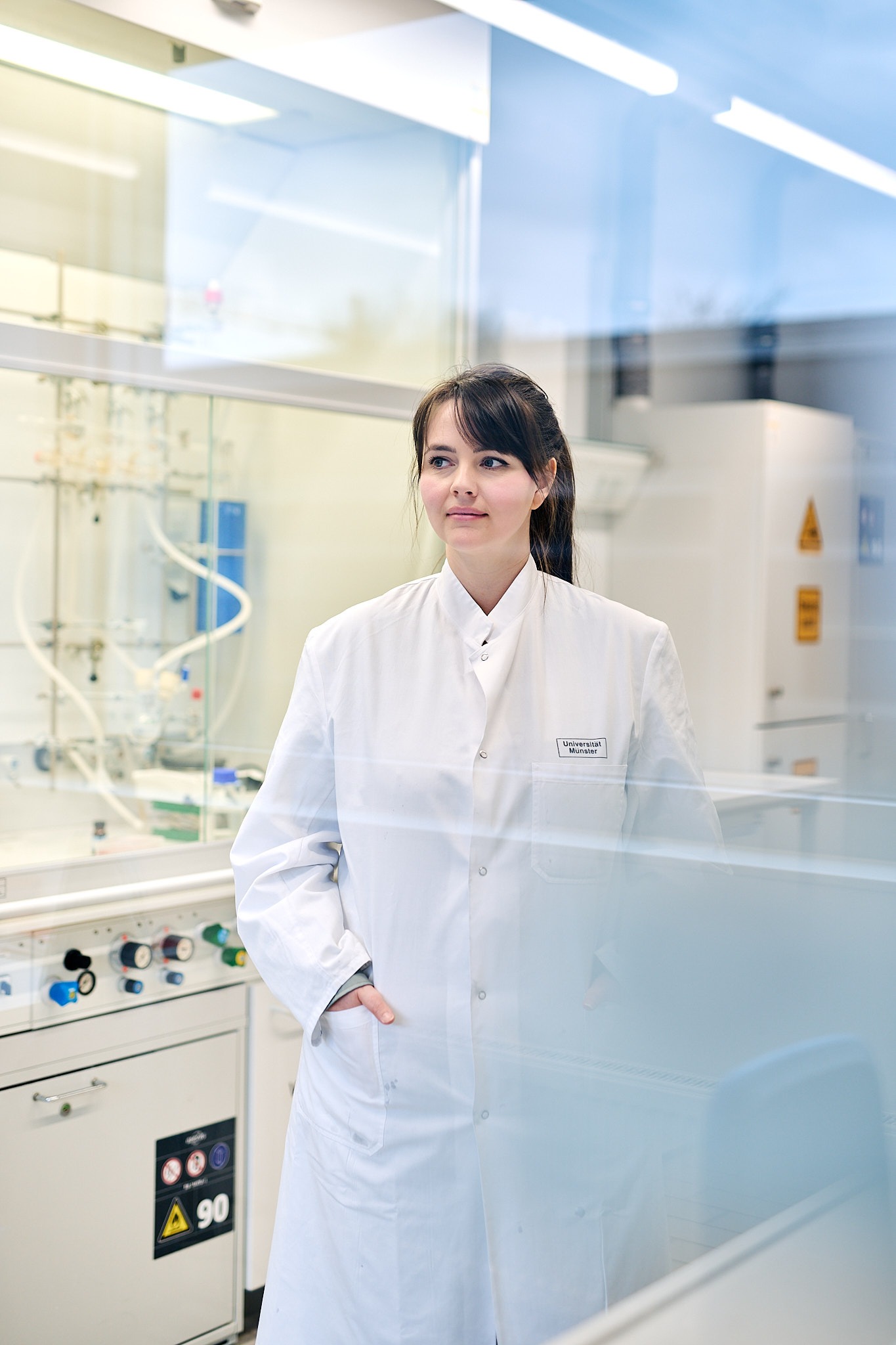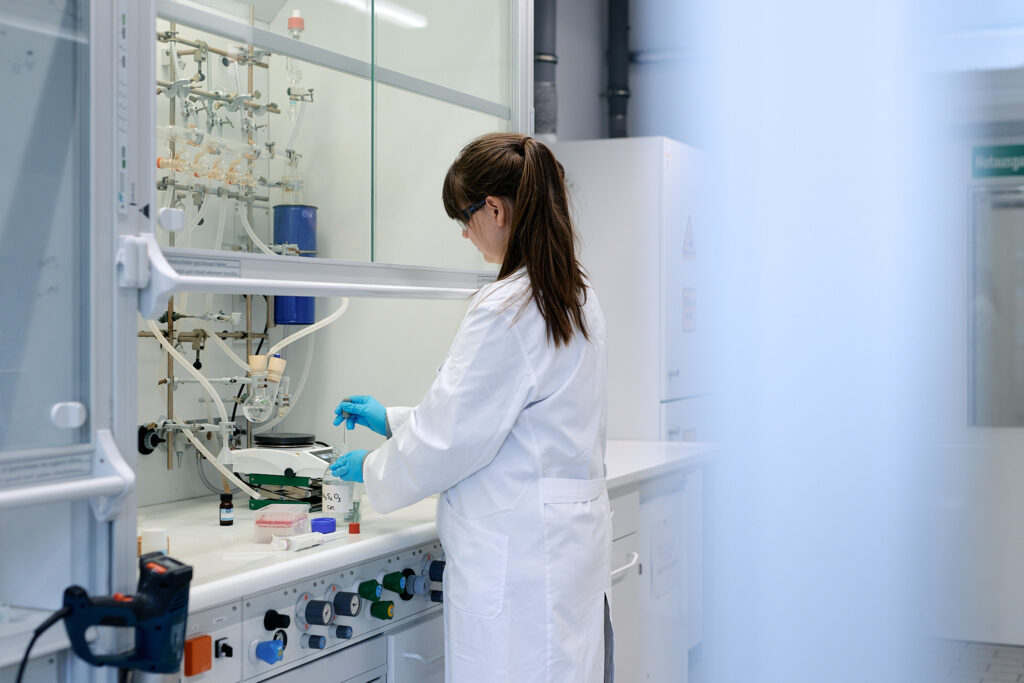
Remote Islands, Fluorinated Sugars, and Bold Discoveries: A Conversation with Dr Emma Campbell – Part I
In the series “33 questions” we introduce, in no particular order, our WiRe Fellows who are currently working on a research project here at the University of Münster. Why 33? Well, if we think of the rush hour of life, it is kind of the age that lies in the middle. And we also like the number😉.
In today’s episode we are getting to know Dr Emma Campbell a bit more personally, with next weeks post diving into her scientific journey.
1. What motivated you to work in the field of Chemistry?
From a very early age I loved science and was encouraged immensely by my teachers in school so I pretty much always knew I wanted to be a scientist. As I grew older I narrowed that down to wanting to work on designing new drugs and finding new treatments. As I progressed through schooling and the early years of university I realized that organic chemistry was the space that ticked all those boxes for me.
2. Describe your work in three words.
Experiments, Purification and Analysis
3. Describe your research topic in three words.
Carbohydrates, Medicine, Fluorine
4. A good chemist needs … ?
Perseverance, critical thinking and enthusiasm.
5. What does a typical workday look like for you ?
I work in a laboratory most of the time. I spend the first 10 minutes of my day planning out my experiments and tasks I want to achieve by the end of the day. I run my experiments and process/analyze the data once complete. I then plan my next steps depending on whether it was successful or not. I troubleshoot problems with my colleagues and we discuss our science at various points throughout the day, always helping each other.
6. What is the best experience you have had as a scientist/researcher ?
I’ve had many great experiences. It’s always highly rewarding when a project succeeds and works well. However, I think the best experience was calling my parents and sister to tell them I had achieved my PhD, seconds after I had finished my viva. My parents sacrificed a lot for me to go to university to achieve my goals, and my sister had been my rock the entire time. Being able to tell them I succeeded was really overwhelming in the best way!
7. What was your biggest research disaster ? What did you learn out of it ?
This probably doesn’t immediately look like a “biggest mistake” but early on in my career I was removing solvent by vacuum in a water bath and didn’t attach a safety clip as I was in a rush. My sample fell into the water bath and I lost it. I realized that I was doing my work poorly and cutting corners because I felt I needed to rush, and rushing leads to mistakes. I learnt that it’s so important to take your time, think things through and to not rush. It’s possible to work quickly and efficiently, without rushing.
8. What keeps you motivated in your work day in and day out ?
I always try to remind myself of the bigger picture and that you can still learn from negative results.
9. Which (historical) important scientist/researcher would you like to have dinner with ? What would you ask ?
I’d quite like to sit down with Alexander Fleming, the scientist famous for discovering penicillin. I would definitely ask his opinion on the challenges of antibiotic resistance today and how he would go about tackling it.

10. If time and money were no object: Which research project would you like to do ?
If money was absolutely no object (and I guess time too), I’d love to try and create a diagnostic map of sugars found on the cell surface of diseased/pathogenic cells to help guide future treatments for disease.
11. What is your favorite research discipline other than your own ?
Definitely the biological sciences. I think understanding natural biological processes is really important for innovation in medicinal chemistry. For example, I find research into PROTACS really interesting. They are drugs that use the body’s own processes to turn on protein degradation. A lot of diseases are caused by having too much of one protein or a protein being unwanted. It’s a really great example of exploiting the body’s natural processes to tackle disease.
12. What do you consider the greatest achievement in the history of science/research/your field?
It’s really hard to choose. But ones I always come back to is how quickly science was able to advance after the development of analysis techniques, like Nuclear Magnetic Resonance Spectroscopy (NMR) and DNA sequencing. I use NMR, like most organic chemists, every single day and my work would be so much harder and take immensely longer to complete if I didn’t have it.
13. Which experience in the world of science disappointed you the most ?
It’s always disappointing to hear stories of PhDs and Post-docs who are taken advantage of by their superiors/Professors and treated poorly. I really do believe attitudes are changing over time – it would just be nice if it happened a little faster!
14. What was the funniest moment you had in science ?
I think any time you are working with kids, something hilarious has a high potential of happening. I’ve done a number of demonstrations in schools getting young children interested in science and I always left smiling and laughing at the end of the day.
15. How did you survive your PhD time ?
My friends and family, particularly my partner, were extremely supportive and patient listening to any troubles I was having. Going for walks in the fresh air when I felt overwhelmed also really helped.
16. What advice do you have for future PhD students ?
Something I wish I had done was keep up with hobbies. You need time to distance yourself from your project and to de-stress. I picked up running again when I started my post-doc and its been the best thing for my mental health that I’ve done in years. If you burn yourself out it will take you so much longer to recover than if you maintain a healthy work-life balance consistently. It’s hard when you are under pressure to deliver results, but it really is essential.
17. What direct or indirect relevance does your research have for society ?
Antibiotic resistance is one of the major challenges facing the medical community today. The overuse/misuse of antibiotics in the past few decades has led to them to becoming less effective and caused the appearance of super bugs like methicillin-resistant Staphylococcus aureus (MRSA), Clostridium difficile (C. diff) and multi-drug-resistant tuberculosis (MDR-TB). These infections have become extremely challenging to treat, especially in hospitals, where patients already are in compromised health and are more susceptible to infection. Antibiotics are a vital class of medicines but are at risk of becoming obsolete if we don’t drastically change how we treat infection. The obvious answer is to develop new antibiotics that aren’t resistant. And that has worked to some degree, however development takes years and doesn’t treat the root of the problem as if we solely rely on antibiotics, resistance will inevitably develop again.
Another way to do this is to vaccinate against bacteria so the infection cannot propagate in the first place. This would ease the high demand on antibiotic usage, where they could be used only in extreme cases and would thus slow down antibiotic resistance. And this has already been proven to be successful. The sugar coating on the surface of bacteria can be used as a vaccine to train the body to recognize the outside of the bacteria, without the harmful bacteria attached to it, so when the bacteria does eventually infect a patient, they already have the antibodies ready to fight the infection.
18. How would you explain your research area and topic to a child ?
Bacteria can make you sick. But a way we can stop that is by protecting you from the bacteria with a medicine called a vaccine. Vaccines work by putting a safe part of the bacteria into your body so it can train how to fight it in a safe environment, like when a boxer trains at home for a boxing match. When we put it into your body your defending cells, called your immune system, memorize what the safe part of the bacteria looks like, like a boxer learning their opponents moves. When you get sick with the bacteria you are match ready, the body remembers what it looked like, and knows how to attack it, “knock it out” and make you better.
19. What surprised you most about the University of Münster ?
The facilities. I was amazed at the facilities and access to equipment. The campus is also a lot larger than I was expecting as it extends quite far into the city. There’s also a lot more greenery on campus than I thought there would be and that is quite helpful when you need to go outside and clear your head.
20. What is the biggest difference between the academic system you have last done research in and the academic system as you experience it in Münster/Germany ?
“Akademisches Klopfen” aka the academic knock. After a lecture/presentation in Germany, to show appreciation you knock on the desk in front of you (like you would knock on a door) rather than clap. I got caught out on this the first lecture I went to, to some giggles from the audience as I enthusiastically started clapping.
21. If you could change one thinhg about the academic system in which you have last done research in, what would it be ?
More funding and more opportunities. But I think this is universal rather than specific to my previous academic system. The COVID-19 pandemic really showed how effective and efficient the scientific community can be at delivering solutions when it is sufficiently funded.
